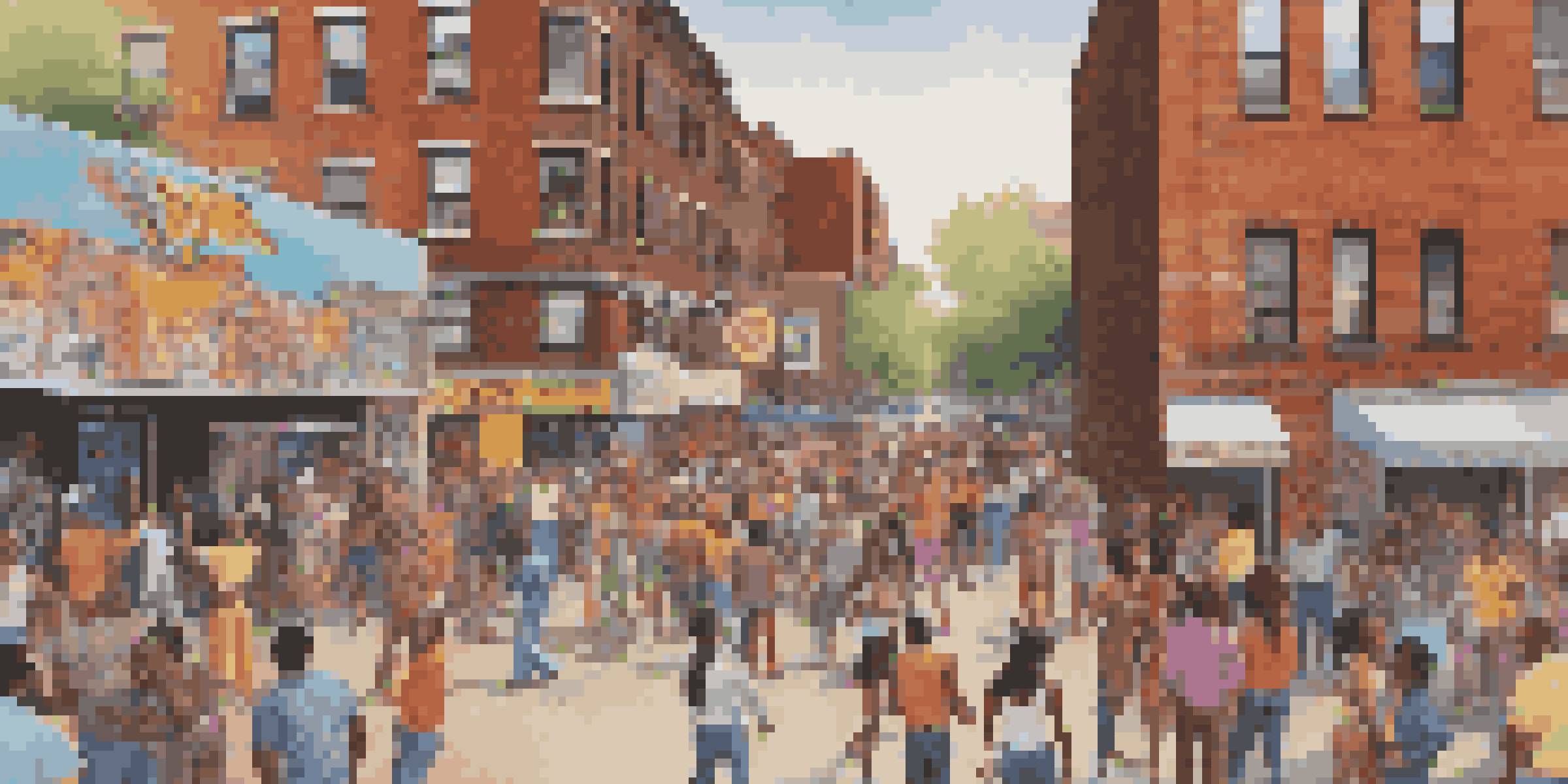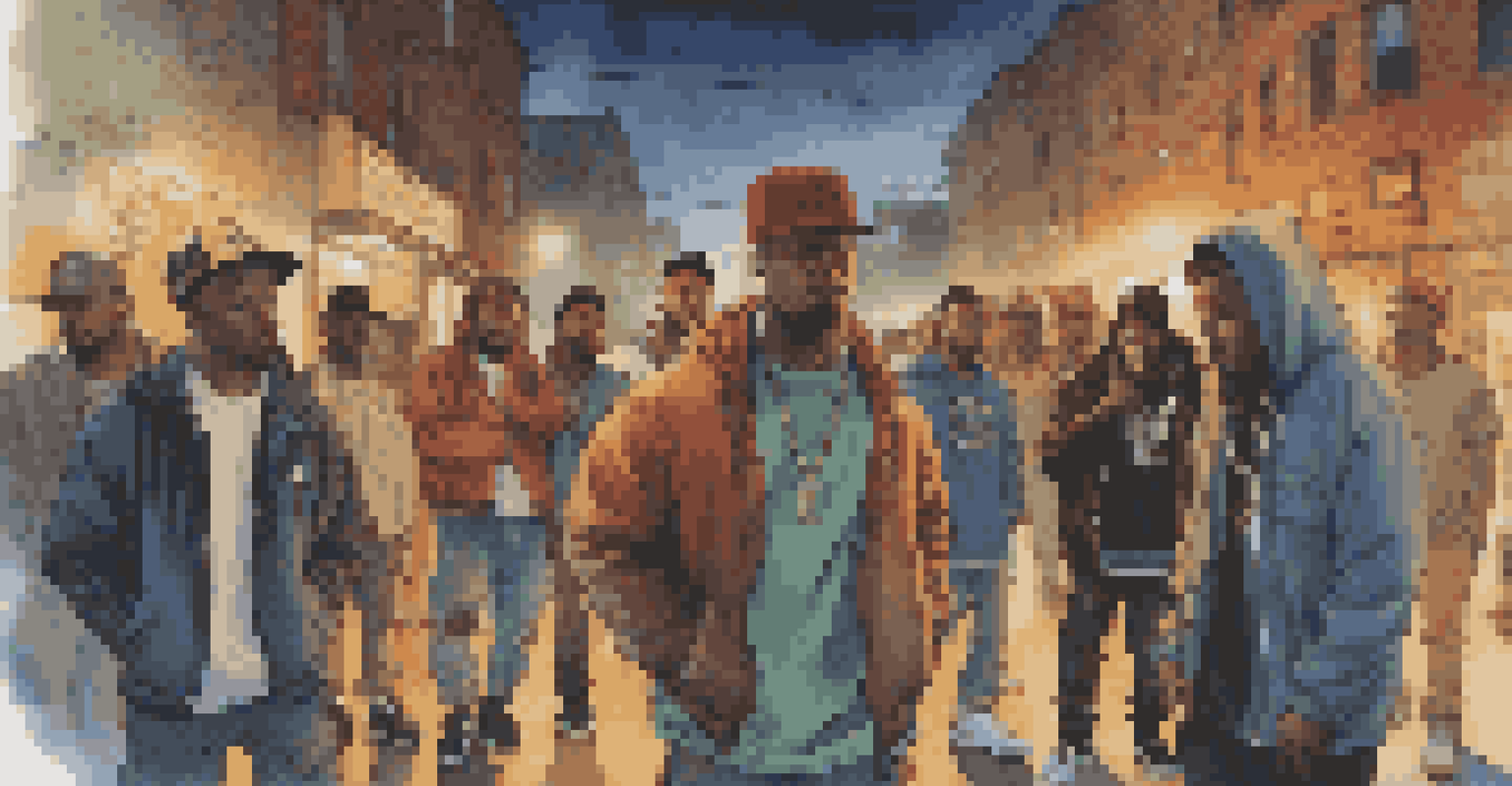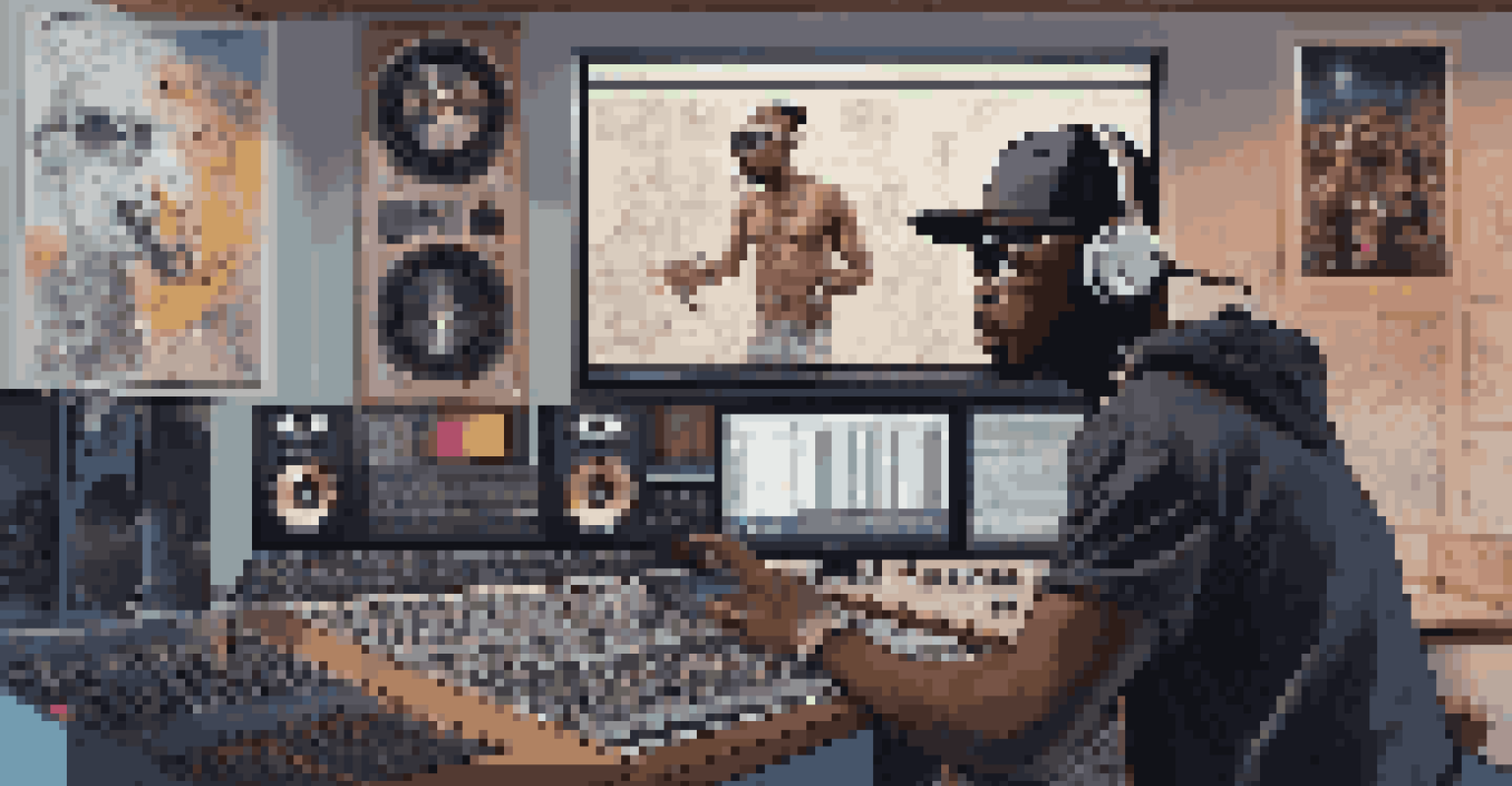Exploring the Cultural Narratives in Hip-Hop Music

The Roots of Hip-Hop Culture and Its Storytelling Origins
Hip-hop emerged in the 1970s in the Bronx, New York, as a voice for marginalized communities. It was a cultural response to social injustices, using storytelling as a powerful tool. From block parties to lyrical battles, the genre has always been about sharing experiences and narratives.
Hip-hop is a way for people to express themselves and tell their stories in a way that is real and authentic.
The early pioneers, like DJ Kool Herc and Grandmaster Flash, laid the foundation by mixing beats and telling stories that resonated with their audiences. This storytelling aspect is what makes hip-hop unique, as it encapsulates the struggles, triumphs, and everyday life of those who create it.
As hip-hop evolved, it began to reflect broader cultural narratives, from the fight against systemic oppression to the celebration of personal identity. These stories are not just entertainment; they are essential pieces of history that document the lived experiences of numerous individuals.
Hip-Hop as a Reflection of Societal Issues and Changes
Throughout its history, hip-hop has served as a mirror to society, reflecting the issues faced by communities. Topics like poverty, violence, and racism are often front and center in hip-hop lyrics, making it a raw and honest commentary on social conditions. Artists like Tupac Shakur and Nas have become synonymous with articulating these struggles through their music.

The genre's ability to convey deep social messages is one reason hip-hop resonates with so many people. It provides a platform for artists to address injustices and inspire change, often sparking conversations that extend beyond the music itself. Through their narratives, they challenge listeners to engage with these pressing issues.
Moreover, hip-hop has also been a vehicle for empowerment, encouraging listeners to rise above their circumstances. It creates a sense of community, where shared experiences foster solidarity and drive collective action.
Personal Identity and Self-Expression in Hip-Hop Lyrics
Hip-hop is not just about the beats; it's a powerful medium for personal identity and self-expression. Artists often share their unique stories, struggles, and triumphs, allowing listeners to connect on a personal level. This authenticity is what draws fans to their favorite artists — it's like hearing their own stories reflected back at them.
The beauty of hip-hop is that it can be used as a tool for social change and empowerment.
For many, hip-hop serves as a safe space to explore complex identities, whether related to race, gender, or sexuality. Artists like Missy Elliott and Lil Nas X challenge conventional norms, using their platforms to advocate for a broader understanding of identity. Their narratives help listeners feel seen and understood, fostering a sense of belonging.
Through their lyrics, hip-hop artists provide insights into their journeys, showcasing the multifaceted nature of being human. This exploration of identity resonates deeply with audiences, making hip-hop a catalyst for personal reflection and communal dialogue.
The Role of Storytelling in Building Community
Storytelling in hip-hop goes beyond individual experiences; it's about building community. Artists often share anecdotes that reflect collective experiences, creating a sense of unity among listeners. Whether it’s celebrating cultural heritage or recounting shared struggles, these stories weave a rich tapestry of life in urban settings.
Live performances and cyphers further amplify this sense of community. They become spaces where people come together to share their stories, celebrate their culture, and support one another. This communal aspect of hip-hop fosters a sense of belonging, reinforcing the idea that we are all part of something larger.
As hip-hop continues to evolve, the importance of storytelling remains a cornerstone of its culture. These narratives not only entertain but also educate and inspire, forging connections between artists and their audiences.
Global Influence of Hip-Hop and Cultural Exchange
Hip-hop's influence extends far beyond the borders of the United States, morphing into a global phenomenon. Artists from various countries adopt the genre, infusing it with their local narratives and cultural contexts. This cultural exchange enriches hip-hop, making it a dynamic and ever-evolving art form.
In places like France, Japan, and Brazil, hip-hop has become a means for artists to address local issues while still connecting with universal themes. The genre's versatility allows it to resonate across cultures, showcasing the shared human experience. For example, French rapper Kery James addresses social inequality in a way that parallels struggles faced by many around the world.
This global reach not only diversifies hip-hop but also fosters understanding among different cultures. By sharing their stories, artists contribute to a broader dialogue about identity, culture, and the human condition, proving that hip-hop is truly a global language.
The Evolution of Hip-Hop Narratives Through Technology
As technology advances, so too does the way hip-hop narratives are told. From the introduction of music videos to the rise of social media, artists now have more platforms than ever to share their stories. This evolution has changed how audiences engage with hip-hop, making it more accessible and interactive.
Platforms like YouTube, Instagram, and TikTok allow artists to reach wider audiences, often bypassing traditional music industry gatekeepers. This democratization of music means that more diverse voices can share their narratives, contributing to a richer and more inclusive hip-hop landscape. For instance, viral challenges and trends can amplify songs and messages quickly, connecting artists with fans in real-time.
Moreover, technology has also transformed the way stories are produced and consumed. With the ability to create and distribute music from anywhere, artists can share their experiences almost instantly, making hip-hop a living, breathing art form that reflects current events and societal changes.
The Future of Hip-Hop and Its Cultural Narratives
Looking ahead, the future of hip-hop remains bright and full of potential. As new artists emerge, they bring fresh perspectives and stories that continue to push the boundaries of the genre. The ongoing evolution of hip-hop ensures that it will remain a relevant and powerful medium for cultural narratives.
With the rise of global collaboration, artists are likely to blend influences from various cultures, resulting in innovative sounds and stories. This fusion not only enriches the genre but also highlights the interconnectedness of our global society, reminding us that we all have stories worth telling.

Ultimately, hip-hop will continue to serve as a platform for expression, resistance, and celebration. As long as there are voices to be heard and stories to be shared, hip-hop will thrive, connecting individuals across divides and fostering a deeper understanding of the human experience.